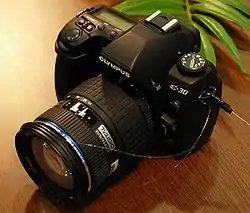 | |
| Overview | |
|---|---|
| Type | Digital single-lens reflex camera |
| Lens | |
| Lens | Four Thirds |
| Sensor/medium | |
| Sensor | Live MOS Four Thirds 17.3 mm x 13.0 mm(2× conversion factor) |
| Maximum resolution | 12.3 million effective pixels, 4032 x 3024 pixels |
| Film speed | ISO 100 to 3200 |
| Storage media | CompactFlash Type I/II (UDMA), Microdrive, xD-Picture Card |
| Focusing | |
| Focus modes | Single Shot AF, Single Shot AF + MF, Continuous AF + MF, Continuous AF, Manual Focus |
| Focus areas | 11-point TTL Phase Difference Detection AF |
| Exposure/metering | |
| Exposure modes | Auto, Program AE with shift), Aperture Priority AE, Shutter Priority AE, Manual, Scene Program, Scene Select (Scene Modes: Portrait, Landscape, Macro, Sport, Night + Portrait, Children, High Key, Low Key, DIS Mode, Nature Macro, Candle, Sunset, Fireworks, Documents) |
| Exposure metering | TTL Open-Aperture Metering System (49 Zones) |
| Flash | |
| Flash | E-TTL II automatic built-in pop-up, 13 m ISO 100 guide number, 27 mm (equivalent in 135 format) lens focal length coverage; compatible with Canon EX Series Speedlite external hotshoe-mount flashes |
| Shutter | |
| Shutter | focal-plane shutter |
| Shutter speed range | 60-1/8000 seconds, bulb shooting |
| Continuous shooting | 5.0 frame/s (RAW 12 frames maximum) |
| Viewfinder | |
| Viewfinder | Eye-Level TTL Optical Pentaprism with 98% coverage and 1.02X magnification |
| Image processing | |
| WB bracketing | ±3 stops in 1-stop increments; |
| General | |
| LCD screen | Vari-Angle 2.7" HyperCrystal III TFT LCD with 230,000 pixels |
| Battery | BLM-1 Li-ion battery pack |
| Weight | 730 g (1.6 lb) |
| Made in | China |
The Olympus E-30 is a Four Thirds System camera produced between December 2008 and about 2011. It was the only two-digit model in the E DSLR series, positioned between the Olympus E-520 and the E-3 cameras in terms of size, weight, capabilities and price. It was sold in a kit with the Olympus Zuiko Digital 14-54mm f/2.8-3.5 II lens.[1]
References
- ↑ "Olympus E-30 Camera Review". DigitalCameraInfo. Retrieved 15 July 2011.
Wikimedia Commons has media related to Olympus E-30.
This article is issued from Wikipedia. The text is licensed under Creative Commons - Attribution - Sharealike. Additional terms may apply for the media files.